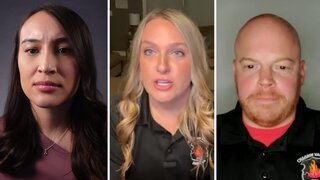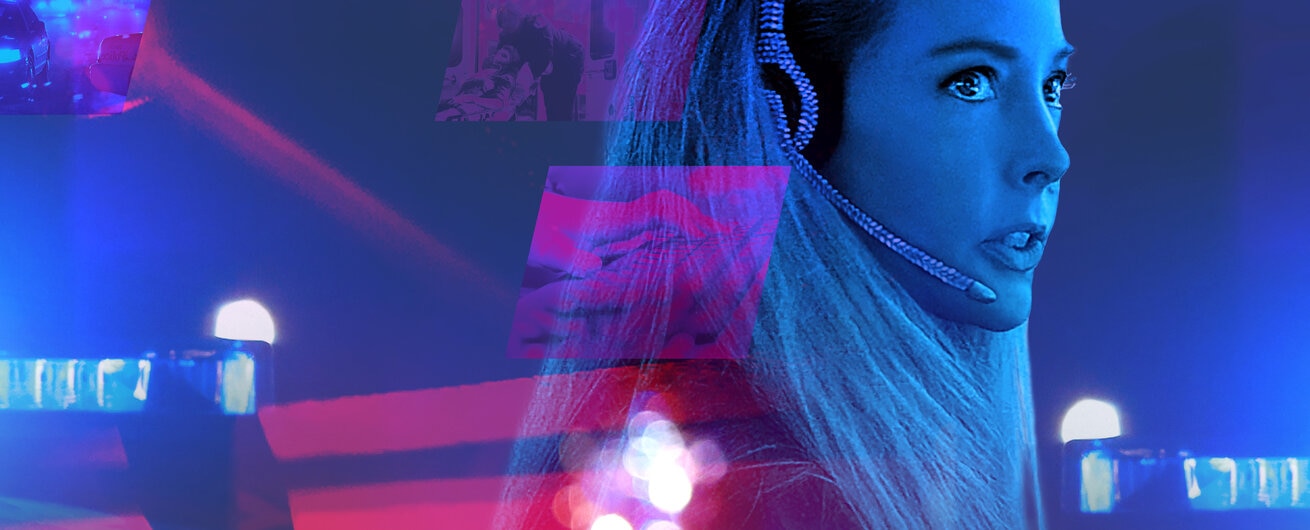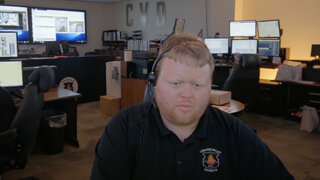Create a free profile to get unlimited access to exclusive videos, breaking news, sweepstakes, and more!
'911 Crisis Center' Stars On How To Teach Your Children To Be Effective 911 Callers
A shocking majority of young elementary students don't know how to properly place a call to 911. "911 Crisis Center" stars say there are a few simple tips to help children get the help they need if an emergency arises.

When 7-year-old Ayden James found his mom on the floor having a seizure last year, he knew just what to do.
The boy called 911 and reported that his mom was “having a seizure.”
“I live in Casa Palmas,” he said in a recording of the call obtained by WFOR-TV. “Is that enough? I don’t know how to do this. I’m freaking out.”
James’ phone call was enough to send emergency personnel to help his mom, Monifa Ramsay—who survived and now thinks of her son as her “hero”—but data shows that most young children aren’t equipped with the knowledge they need to make the life-saving calls.
To help families be better prepared to handle an emergency, real-life 911 dispatchers and stars of Oxygen’s “911 Crisis Center” weighed in during a virtual panel at CrimeCon Give Back-a-Thon Friday with tips to help parents teach their children how to be effective 911 callers.
RELATED: Faith Jenkins Discusses Relationship Red Flags, Yellow Flags, And Green Flags At CrimeCon
“If something’s wrong, if the child feels like you’re in danger, know the number and know your address,” dispatcher Arnold Rinas said on the panel. “I think those are probably the most important things.”
A study last year published by the American Academy of Pediatrics, found the majority of young elementary-age children were not able to dial 911 successfully.
As part of the study, elementary age children participated in a simulation where an adult male began choking while eating a snack as a cellphone lay on a table nearby. Researchers found that none of the children in kindergarten or first grade were able to correctly place the call to 911 using the smartphone, while just 20 percent of those in second and third grade successfully made the call.
“Although mobile devices are ubiquitous in children’s lives today, in this study we found that most primary school–aged children, and particularly those in kindergarten and first grade, are not prepared to respond to an emergency using a smartphone to dial 9-1-1 and communicate the emergency to a dispatcher,” the researchers wrote. “Additionally, most children in kindergarten and first grade were unable to recognize an emergency.”
They concluded that part of the struggle is that much of the education centered around calling 911 focuses primarily on using a landline phone, even though in today’s digital era, according to data from NENA: The 9-1-1 Association, 80% or more 911 calls are made from smartphones.
“911 Crisis Center” dispatcher Jessica Merkowsky urged parents to show their children where the buttons to call 911 are on their phone and help them practice what they might need to do to make an emergency call.
“Explain to them the importance of knowing that it’s for an emergency and not just for fun,” she said.
RELATED: 'Is This The Kind Of Case We Can Solve?' How The 'Cold Justice' Team Picks Cases
Parents Magazine also recommended helping children define what situations might be considered an emergency, role playing what to do if an emergency happens and helping your child memorize other vital information, like their last name and any known medical conditions within the family.
Rinas recommended parents start early with education and teaching children how to place a call to 911 around kindergarten age.
“I know that sounds super young, but 4- to 5-years-old I think is ideal because at that age you can teach them your address,” he said. “They can remember numbers and street names.”
Knowing your location when placing a call to 911 is critical advice not just for children, but adults as well.
“First and foremost, know your address, know which street you’re on, know the nearest intersection or look at a landmark and be able to read a sign,” Rinas said. “Take a deep breath and just focus.”
Merkowsky added that callers need to “stay calm” and listen to their dispatcher.
“We’re here to help, we’re trained to do this,” she said. “If we tell you to take a deep breath and slow down, we’re doing it for reason. You know, we’re typing all this information while also sometimes dispatching it to our officers, so if we tell you ‘one second,’ it’ just because we’re relaying your information to our officers.”
Once children are taught how to be able to successfully place a call, Merkowsky said they are often easier to work with on the phone than their adult counterparts.
“It’s so crazy to say that, but like, honestly, some of the younger callers that we have are easier to speak with and they listen better,” she said. “They answer our questions correctly and they are not just like yelling at us to get the police or the ambulance here now. They really are listening to us.”
The dispatchers spend their days being there for others in their most stressful moments. It can be a challenging job, but Rinas said it’s the support he finds from his coworkers that helps him on even his most difficult days.
“I think one of the best things that happens when you need somebody is you don’t have to ask for support,” he said. “We’re all in the same room, we’re all doing the same job, so there will be plenty of times where after work I’ll get a phone call or a text message, ‘Hey, you ok?’ and that means more to be than me trying to reach out and talk about it.”
Rinas initially thought the job would be a “stepping stone” to a career as a police officer but he soon learned being a dispatcher was where he was meant to be.
“I absolutely love it,” he said.
You can stream episodes of 911 Crisis Center here.



























